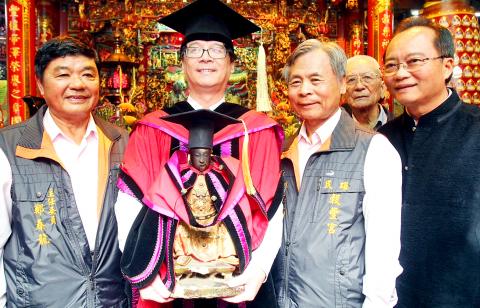Taoist deity Shennong (神農大帝, God of Agriculture) was yesterday conferred with a distinguished honorary doctorate by the Chiayi County-based National Chung Cheng University in a gesture of gratitude for a local temple’s donation of land during the university’s founding.
Shennong was the first deity to receive a diploma from a Taiwanese university and possibly the world’s only divine being with a doctorate, university president Wu Jyh-yang (吳志揚) said.
When the school was founded in 1989, it was built on 131 hectares of farmland previously owned by the the Shennong-worshipping Gufeng Temple, 60 hectares of which were a donation, a crucial factor in the decision to build the university in Chiayi rather than Yunlin or Tainan, which were vying to host the new university, Wu said.

Photo: Yu Hsueh-lan, Taipei Times
For the conferment ceremony yesterday, the divine being’s idol was clothed in an custom-tailored academic robe and its head was adorned with an academic square cap.
Wu moved the cap tussle, in view of people who attended as Shennong’s guests of honor.
Renowned embroider and tailor Chou Jang-ting (周讓廷) from the county’s Putzi city (朴子) was commissioned by the school to make Shennong’s academic robe.
Chou said tailoring Shennong’s robe took 100 hours in comparison with the typical 10 hours needed for most other temple idols.
The decision to accept the conferment of the degree from the school was made unanimously by the temple’s board of directors, Gufeng Temple Secretary-General Lai Hsiao-te (賴孝德) said, adding that members of the board felt this was a happy event.
Wu said that while many universities had conferred honorary degrees to people who had contributed to their founding or distinguished members of society, including former president Lee Teng-hui (李登輝) who received a National Chung Cheng University honorary doctorate, the distinguished honorary doctorate given to Shennong was the highest honor of its kind.
“It is only appropriate for us to demonstrate our gratitude to the temple,” he said, referring to the temple’s donation.

Alain Robert, known as the "French Spider-Man," praised Alex Honnold as exceptionally well-prepared after the US climber completed a free solo ascent of Taipei 101 yesterday. Robert said Honnold's ascent of the 508m-tall skyscraper in just more than one-and-a-half hours without using safety ropes or equipment was a remarkable achievement. "This is my life," he said in an interview conducted in French, adding that he liked the feeling of being "on the edge of danger." The 63-year-old Frenchman climbed Taipei 101 using ropes in December 2004, taking about four hours to reach the top. On a one-to-10 scale of difficulty, Robert said Taipei 101

Nipah virus infection is to be officially listed as a category 5 notifiable infectious disease in Taiwan in March, while clinical treatment guidelines are being formulated, the Centers for Disease Control (CDC) said yesterday. With Nipah infections being reported in other countries and considering its relatively high fatality rate, the centers on Jan. 16 announced that it would be listed as a notifiable infectious disease to bolster the nation’s systematic early warning system and increase public awareness, the CDC said. Bangladesh reported four fatal cases last year in separate districts, with three linked to raw date palm sap consumption, CDC Epidemic Intelligence

US climber Alex Honnold left Taiwan this morning a day after completing a free-solo ascent of Taipei 101, a feat that drew cheers from onlookers and gained widespread international attention. Honnold yesterday scaled the 101-story skyscraper without a rope or safety harness. The climb — the highest urban free-solo ascent ever attempted — took just more than 90 minutes and was streamed live on Netflix. It was covered by major international news outlets including CNN, the New York Times, the Guardian and the Wall Street Journal. As Honnold prepared to leave Taiwan today, he attracted a crowd when he and his wife, Sanni,

Taiwanese and US defense groups are collaborating to introduce deployable, semi-autonomous manufacturing systems for drones and components in a boost to the nation’s supply chain resilience. Taiwan’s G-Tech Optroelectronics Corp subsidiary GTOC and the US’ Aerkomm Inc on Friday announced an agreement with fellow US-based Firestorm Lab to adopt the latter’s xCell, a technology featuring 3D printers fitted in 6.1m container units. The systems enable aerial platforms and parts to be produced in high volumes from dispersed nodes capable of rapid redeployment, to minimize the risk of enemy strikes and to meet field requirements, they said. Firestorm chief technology officer Ian Muceus said